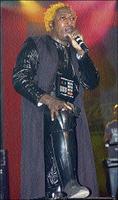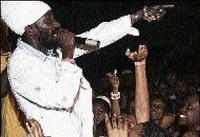Krista Henry and Teino Evans, Staff Reporters
Elephant Man could also be banned from performing in Ottawa.- file
The dancehall fraternity silent about the 'gay attacks' on local artistes who have had their shows abroad cancelled and in some instances been banned, might soon have to break its silence.
For years, protests from gay activists have dogged the careers of Jamaican artistes internationally. Deejay Shabba Ranks' career was stopped in mid-flight when he experienced the backlash of responding to a question about Buju Banton's Boom Bye Bye. And, since doing that song in the early 1990s, Buju has been plagued across the globe with banned concerts, a trend which has now spread to the likes of Beenie Man, T.O.K., Capleton, Sizzla, Elephant Man and others.
If gay activists get their way, Sizzla and Elephant Man will no longer be allowed to enter the Canadian capital of Ottawa. The Canadian Gay Rights Lobbyist, in collaboration with the U.S.-based 'Stop Murder Music', campaign, has decided to try to convince city officials in Ottawa to ban the reggae artistes based upon their refusal to sign the Reggae Compassionate Act, a document of allegiance to the campaign's mission.
The group is claiming that the performers incite hatred against gays and lesbians and are breaching Canada's anti-prejudice laws, which state that people who incite hate crimes may not be permitted to enter the country. At the 2007 U.K. MOBO awards, Elephant Man and Vybz Kartel had their nominations withdrawn due to homophobic lyrics. MOBO organisers demanded the pair apologise for anti-gay lyrics in some of their early songs after complaints from gay rights campaigners.
These are just a few examples from many instances that have occurred in the United States, England, France, Canada and parts of the Caribbean, which have huge consequences for the music. Despite being banned, there are numerous artistes, such as Sizzla and Buju Banton, who are not backing down.

Sizzla could be banned from performing in Ottawa, Canada. - Nathaniel Stewart/Freelance Photographer
tricky issue
While some chose to maintain their silence, like president of the Jamaica Federation of Musicians (JFM), Desi Young, who said he had "no comment" on the issue because it was a "tricky issue", others have voiced their opinion.
According to Jerome Hamilton of Headline Entertainment, the constant bans could mean bad news for the music on a whole. Hamilton said that the industry needs to tackle the issue and to define what the problem is, whether it is that these artistes have sung homophobic lyrics or continue to sing and perform homophobic lyrics.
"No one can stop the artistes from saying it's wrong. However, spouting violence as a solution to the problem of homosexuality is wrong. There are issues in promoting murder music, which is wrong. Some of the messages are too strong and a lot of it is misunderstood. We don't want people to equate our music with homocentric issues and think there is nothing more to these artistes... They should not be judged by that," Hamilton said.
He added that "there are not enough artistes crossing the threshold into American music and right now, with record sales and ticket sales down, we don't need that distraction".
While there was a major debate over the popular Chi Chi Man song by dancehall group T.O.K., they say they have not been affected by gay right activists and don't see the campaigns as having any significant impact on dancehall music.
"There is no evidence that gay right activists have impacted dancehall music in any significant way. I think dancehall music is stronger than any one topic or force, I mean apart from certain artistes not being able to travel to certain parts of the world because of things they have said (in their songs) in the past, I can't say for sure that they have had much impact," Craig T said.
He added that it "is a double-edged sword. There is a fine line between freedom of speech and censorship an' is just a line that all artistes have to be aware of and depending on who is listening to the song, it might me construed differently".
negative impact
Another T.O.K. member, Alex, felt that these campaigns only highlight dancehall in the same negative light.
"I feel it has a negative impact because they feel that dancehall music is only centred around one topic and it is sad that these people always try to isolate and paint dancehall music in a negative light," Alex said.
In looking at further possibilities of reaching an amicable solution to the problem, entertainment lawyer Lloyd Stanbury says "I think the solution has to start with honesty on both sides. The gay activists need to demonstrate clearly that their actions are not in fact a strategy to promote and spread the acceptance of their lifestyle and resist any objections that might come from persons who do not subscribe to it".
He continued: "On the other hand, the reggae and dancehall community need to demonstrate clearly that they are not in fact promoting violence against gays".
Additionally, Clyde McKenzie of Shocking Vibes Limited says "I think it has to be a case where we open the eyes of the artistes of what opines internationally and they decide what to utter or confine themselves. Different countries have laws and we can't change these laws, so the only thing we can do is build awareness among the artistes. I think a lot of the artistes are now coming to understand that maybe if they want to operate in certain markets they will have to know the guidelines and once you have that kind of awareness then everything will be cool".
"I think sometimes the artistes are being penalised for things they say here (in Jamaica) because people (worldwide) can hear your utterances in Jamaica and they judge you and form protests against you based on what is said," McKenzie said.

